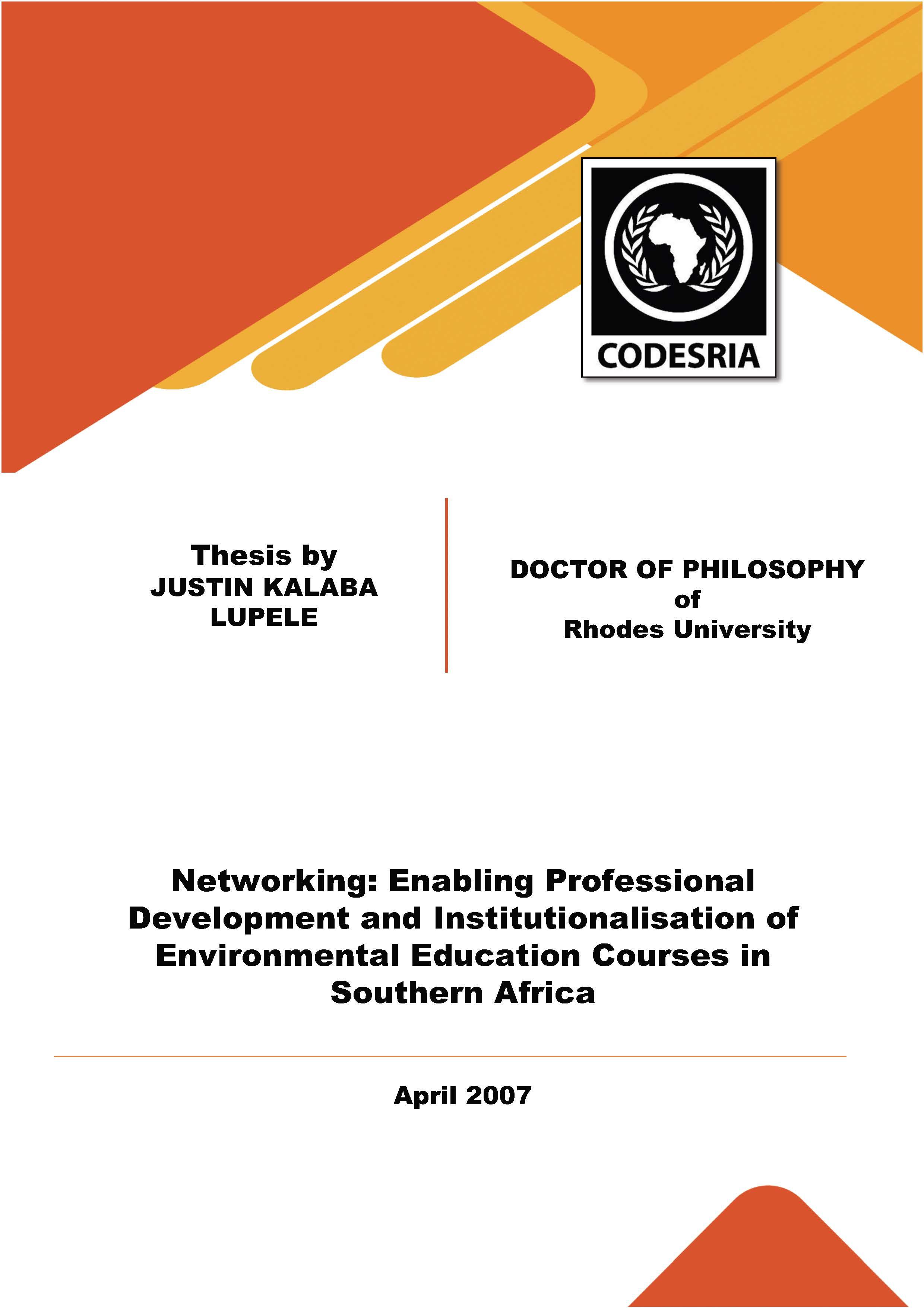Networking: Enabling Professional Development and Institutionalisation of Environmental Education Courses in Southern Africa
Keywords:
Networks, environmental education, educational development, courses, SADC, professional development, institutionalisation, education networks, Southern AfricaSynopsis
This study was aimed at understanding how networking can enable or constrain
professional development and institutionalisation of environmental education courses in
southem Africa in the context of the Course Development Network (CDN), a project of
the Southern Africa Development Community Regional Environmental Education
Programme (SADC REEP). The study involved 12 institutions (each institution was
represented in the CDN by a staff member) in eight SADC member states. It was
contextualized through a review of social, political, environmental and educational
developments in southem Africa, with specific reference to regionalization processes, as
the SADC REEP is constituted under this post-colonial political framework.
Relational philosophy informed the research process and methodology. The philosophy
underpinned three distinct, yet related theoretical perspectives namely: critical realism,
which provided the ontological perspectives of the study; Actor Network Theory; and
Community of Practice, which provided the epistemological perspectives.
Data was generated during a 33-month period in southem Africa and 12 months in the
United Kingdom (and on a one week visit to Italy). During a 12 month Split Site
Commonwealth Scholarship award, tenable at Manchester Metropolitan University in the
United Kingdom, I studied the Environment and School Initiative (ENSI) and the
Sustainability Edl.lcation for European Primary Schools (SEEPS), to examine whether the
same mechanisms that made them successful would apply to the CDN in the context of
southern Africa. While these two case studies provided useful insight into the
relationship between networking, professional development and institutionalization of
environmental education programmes, they were not the main focus of the research.
Data analysis was mainly through inductive, abductive and retroductive modes of
inference. Inductive data analysis was done by means of Nvivo - a computer software
package used for qualitative data analysis. The software aided in revealing features and
relationships in the data in more depth as it allowed flexibility in working with data.
Abduction is the interpretation of a phenomenon by means of a conceptual framework.
Downloads
References
Abdal-Haqq, I. (1996). Making timefor teacher professional development. Washington DC: Eric Digest.
Achebe, C. (2000). Home and exile. Edinburgh: Canongate.
Africa Watch (1991). Academicfreedom and human rights in Africa. An Africa Watch Report. USA: Human Rights Watch.
Altrichter, H. (2005). The role of the 'professional com.munity' in action research. Educational Action Research, 13.
Anyinefa, K. (2000). Postcolonial postmodemity in Henri Lopes's Le Pleurer-Rire. In D.Gover, J. Contech-Morgan, & J. Bryce (Eds.), The post-colonial condition of
the African literature (6 ed., pp. 1-4). Asmara, Eritrea: Africa World Press.
Archer, S. M. (1982). Morphogenesis versus structuration: on combing structure and action. British Journal of Sociology, 33, 455-483.
Archer, S. M. (2003). Structure, agency and the internai conversation. Cambridge: Cambridge.
Barrow, C. J. (1999). Environmental management: Princip/es and practice. London: Routledge.
Bazeley, P. & Richards, L. (2000). The NVivo: Qualitative project book. London: Sage.
Berg, B. L. (2004). Qualitative research methodsforsocial sciences (5th ed.). Boston: Pearson.
Bhaskar, R. (1997). A realist theory of science. London: Verso.
Booth, A., McCullum, J., Mpinga, J., & Mukute, M. (1994). The state of the environment
in southern Africa. Harare: SARDC - Southern African Research & Documentation Centre.
Bouckaert, G. (1998). Sustainable development of networks in a governance context. In F.Theron, Van Rooyen, & U. Frederik (Eds.), Spanning the global divide:
networkingfor sustainable development (pp. 40-56). Bellville: University of S tell en bosch.
Braaksma, J., Faber, K., Grossenbacker, S., Rauch, F., Schrittesser, 1., Segers, J. (2003).
Networks as support structure for quality development in education. Klagenfurt:
Center for School Development, Austrian Federal Ministry for Education, Science and Culture.






